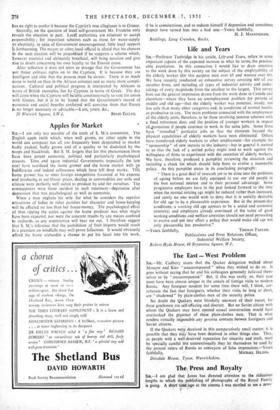Life and Years
S1R,—Professor Tunbridge in his article, Lire--and Years, refers to some important aspects of the expected increase in what he terms the pension- able population. In this connection I would like to draw attention to the work done by this society on the subject of the employability of the elderly worker (-(or this purpose men over 65 and women over 60). We have recently conducted an exhaustive survey covering 400 of our member firms, and including all types of industrial activity and under- takings of every magnitude from the smallest to the largest. This survey bore out the general impression drawn from the work done in Canada and elsewhere—where they have an unemployment problem for persons of middle and old age—that the elderly worker was punctual, steady, not less safe than many other categories and, in conditions of normal health, as productive as any. The main problems connected with the employment of the elderly seem, therefore, to be those involving pension schemes with a fixed retirement date, and the position of younger workers in respect oLiromotion if people continue to work in the same jobs. Some firms have " restudied " particular jobs so that the elements beyond the physical capabilities of elderly workers have been eliminated. Others have transferred elderly workers to other employment—for example the " sponsorship " of new recruits to the industry—but in general it seemed to us that the lack of a settled policy might tend to work against the willingness of firms to experiment with the retention of elderly workers. We have, therefore, produced a pamphlet reviewing the situation and including a check list which should help firms to evolve a reasonable policy. As this pamphlet states in its concluding paragraph:
"There is a great deal of research yet to be done into the problems of ageing before we are fully equipped to use our old people in the best national interest and to their personal advantage. Some progressive employers have in the past looked forward to the time when the normal retiring age might be reduced rather than increased, and surely no one would wish to deny that it is socially desirable for old age to be a pleasurable experience. But in the present-day conditions, a working old age appears to be a social and economic necessity; and employers already convinced of the value of good working conditions and welfare amenities should not need persuading to evolve and' peg into effect a policy that would make old age not only pleasurable but productive."
Publications and Press Relations Officer, Industrial Welfare Society.
Robert Hyde House, 48 Bryanston Square, W.I.


















































 Previous page
Previous page